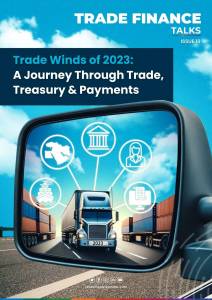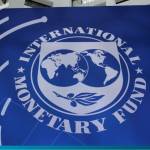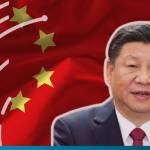Estimated reading time: 5 minutes
Trade facilitation and trade finance are critical and closely linked in ensuring broad-based economic development by encouraging the cross-border exchange of goods and services.
In this episode of Trade Finance Talks, TFG’s Deepesh Patel was joined by Karin Oszuszky, Senior Investment Manager for Business Development at the OPEC Fund for International Development, during the European Bank for Reconstruction and Development’s (EBRD) Trade Facilitation Annual Conference in Vienna to discuss the OPEC Fund’s work in light of the latest trends and developments in trade finance and facilitation.
Oszuszky is the trade finance specialist within the Private Sector Trade Finance Operations Department and is responsible for the origination of business from corporate customers, as well as commercial or financial institutions for the trade finance and private sectors.
Helicopter view: The OPEC Fund for International Development
Risk management along geopolitical, macroeconomic, as well as default risks, stood out as a key theme throughout the conference, and the importance of the OPEC Fund’s work is well contextualised here.
Founded in 1976 by member states as a south-south multilateral development finance institution, it operates based on a global mission working in low and middle-income countries outside of OPEC member states, seeking to foster south-south trade in a manner that is informed by the Sustainable Development Goals (SDGs).
Oszuszky said, “This year actually was a very successful year for the OPEC Fund because we placed our inaugural benchmark bond in the market.”
The OPEC Fund operates through two main windows: the Public Sector; and the Private Sector and Trade Finance Operations Departments.
The Public Sector workstream focuses on the provision of financing to governments for projects in essential areas such as health and infrastructure.
The Private Sector and Trade Finance windows serve as complementary instruments for the OPEC Fund, aiding in its central mission to advance the socioeconomic development of beneficiary countries through trade finance services and access to capital.
In alignment with this, the Private Sector and Trade Finance Department concentrates on financing corporates, financial institutions, and project finance.
The Trade Finance workstream specifically operates a diversified portfolio covering import–export transactions, structured commodity finance, as well as the financing of commercial banks to support international trade.
The OPEC Fund also has unfunded trade finance risk-sharing programmes in place which are shared with commercial bank partners and international development finance institutions.
Via trade finance, the OPEC Fund seeks to support private enterprises and governments through the facilitation of their import and export requirements, assisting in addressing inventory and working capital needs, as well as improving the cross-border trade prospects for partner countries.
Oszuszky said, “It [the OPEC Fund] is very well diversified because we have a worldwide mandate, [and] we work in 125 countries.”
Ensuring emerging markets’ access to finance
According to the Asian Development Bank, the global trade finance gap expanded to $2.5 trillion in 2022. Poorer countries tend to suffer most from this gap, which is where the work of the OPEC Fund becomes essential for facilitating international trade to alleviate these challenges.
The OPEC Fund works through both its Public Sector, and Private Sector Trade Finance Operations Departments to increase emerging markets’ access to finance, ensuring member countries and partner organisations can benefit from financing solutions.
Under its Private Sector and Trade Financing windows, funding has been provided to over 350,000 Micro-, Small, and Medium-sized Enterprises (MSMEs).
Additionally, the OPEC Fund promotes thematic financing streams. For example, post-COVID, it dedicated approximately $1 billion towards COVID-19 impact and recovery initiatives in developing countries.
In response to the food crisis arising from the supply chain disruptions due to the conflict in Ukraine, it deployed $1 billion towards food security initiatives through its Food Security Action Plan.
Additionally, in response to, “the core challenge of our times” Oszuszky said, “We adopted a Climate Action Change Plan in September 2022, under which we set ourselves objectives to dedicate 40% of our new financing for climate change [related projects].”
Managing risk through partnerships
The OPEC Fund also works with other multilateral development institutions in risk-sharing partnerships. The EBRD was its first partner in this regard, with the two actively working together on risk-sharing projects since 2008, particularly in Central Asia and the Caucasus region.
Oszuszky said, “We also have other risk-sharing programmes in place with other development finance institutions and commercial banks. So we are quite diversified.”
Technology and trade finance
Following the trends of the trade finance community, technological development is still a major topic for many.
For Oszuszky, the focus is on digitalisation, with an emphasis on putting evolution before revolution.
The OPEC Fund has adopted a range of digital tools in this regard to help streamline risk management processes, as well as specialised structured products in trade finance that are tailored to customers’ and partners’ needs.
In particular, it is looking towards an online customer portal where the customers can input financing requests, as well as additional details.
According to Oszuszky, “We are also considering the utilisation of artificial intelligence (AI) and have test programmes running for more standardised tasks. In particular, we have a trial for AI and compliance, and the standard compliance KYC tasks.”
These first steps will be used to inform its digitisation actions moving forward, focussing on streamlining operations through technology adoption.
By adopting digital technologies and implementing risk-sharing practices more widely, the international trade industry can make a tangible impact on development. Specifically, these steps can support initiatives that generate jobs, enhance production, and increase lending capacity.
In doing so, the efforts will empower sectors and regions that most urgently need access to such trade finance services, having a multiplier effect on sustainable socioeconomic development.

















































